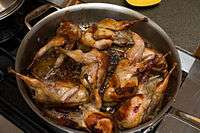Quails in cookery

Both Old World and New World quail include edible game species. The common quail used to be much favoured in French cooking, but quail for the table are now more likely to be domesticated Japanese quail. The common quail is also part of Polish cuisine, Maltese cuisine, Portuguese cuisine, Italian cuisine and Indian cuisine. Quails are commonly eaten complete with the bones, since these are easily chewed and the small size of the bird makes it inconvenient to remove them.
Quail that have fed on hemlock (e.g., during migration) may induce acute renal failure due to accumulation of toxic substances from the hemlock in the meat; this problem is referred to as "coturnism".[1]
A persistent myth holds that it is impossible to eat quail every day for a month. This has been the subject of a number of proposition bets; however, it has been achieved on several occasions.[2]
This "every-day-for-a-month" estimation may have been derived from a Biblical passage about quails. The children of Israel, having become bored with eating manna, demanded flesh to eat. God then gave them quails, but with this warning: "Ye shall not eat one day, nor two days, nor five days, neither ten days, nor twenty days; but even a whole month, until it come out at your nostrils, and it be loathsome unto you: because that ye have despised the Lord which is among you, and have wept before him, saying, Why came we forth out of Egypt?" (Numbers 11:19-20, KJV). Later in the passage, we are told, "And while the flesh was yet between their teeth, ere it was chewed, the wrath of the Lord was kindled against the people, and the Lord smote the people with a very great plague" (Numbers 11:33, KJV). Any kind of food-borne pathogen may have been present (e. coli, salmonella, etc.); but hemlock poisoning may have been the most likely suspect, for the people to have died so quickly.
See also
References
- ↑ Tsironi M, Andriopoulos P, Xamodraka E, et al. (2004). "The patient with rhabdomyolysis: have you considered quail poisoning?". CMAJ. 171 (4): 325–6. doi:10.1503/cmaj.1031256. PMC 509041
 . PMID 15313988.
. PMID 15313988. - ↑ "Quail".
| Wikibooks Cookbook has a recipe/module on |

